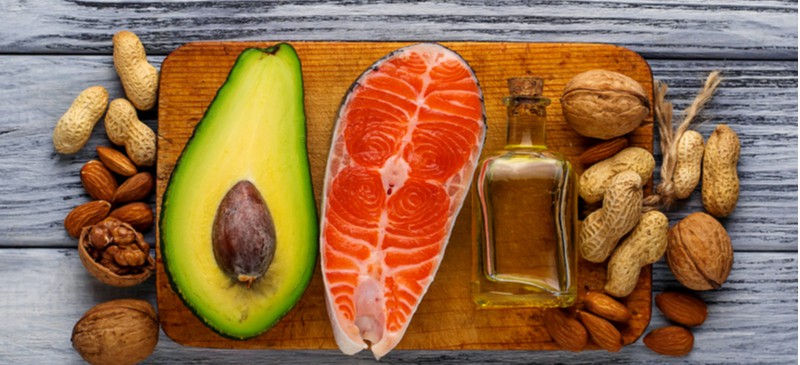
Throughout this recent pandemic, we’ve all seen grocery shoppers loading their carts with processed foods. But while boxes of macaroni and cheese fly off the shelves, the produce department remains fully stocked, and I haven’t seen much of a shortage of high-quality meat and fish, and healthy fats.
Yet when I suggest to people that the healthiest diet they could possibly consume during these challenging times contains more of these higher fat foods and less of the processed non-perishables we’re all stocking up on, many look at me as if I’ve lost my mind. “What about all that fat and cholesterol?” they ask. “Won’t that give me heart disease?”
Well, no. They won’t. But here’s the bigger dilemma: It seems everyone these days is offering dietary advice. But who do you believe and how do you make smart decisions about what to put into your body?
Some Nutrition Advice Has Been Outdated for Decades
I study nutritional studies voraciously, and it’s disappointing to me when well-known organizations offer dietary advice based on a mix of old and new data. Much of it is simply not in line with what we know today.
In fact, one nutritionist — Dr. Zoe Harcombe — published a paper about the phenomena in the BMJ. The title says it all: “Evidence from randomised controlled trials does not support current dietary fat guidelines: a systematic review and meta-analysis.”1
So, why do doctors and other so-called experts continue to recommend avoiding high-fat diets? Here’s why I think this happens: It’s far easier to just repeat the same old talking points — avoid cholesterol and saturated fat — than to actually teach people to make the dietary changes that would make them healthier.
Another reason why it’s so hard to get a straight answer about foods is that foods, like people, don’t fall into neat categories called “bad” and “good.” For example, not all saturated fats are “bad” and not all unsaturated oils are “good.” Some saturated fats have an either neutral or positive effect on health (i.e. Malaysian palm oil), while some unsaturated fats (such as vegetable oils like corn and soybean) are pro-inflammatory and should be avoided!
To be clear, several studies over the past decade have clearly demonstrated that saturated fat does not cause heart disease. Meanwhile, canola, sunflower, corn and soy are now known to be highly inflammatory! And, as Dr. Sinatra and I point out in our book, “The Great Cholesterol Myth,” inflammation is an accompaniment or promoter of just about every degenerative disease you don’t want to get, including heart disease!
So now, instead of just trying to avoid all saturated fats, you need to remember which fats to avoid and which fats are good for you.
Why has medical advice remained the same for decades even as health issues proliferate in America? In the new feature length documentary Fat Fiction, I joined other leading health experts in examining the facts and myths of saturated fats in the human diet.
In the film, we share more than a decade of published research confirming that fat, particularly saturated fat, was wrongly demonized. It is not a causative factor in heart disease. Worse, the low-fat dietary guides we’ve been following since the 1980s were never based on hard science, as the Zoe Harcombe paper, mentioned above, clearly demonstrated.
READ RELATED: How To Up Your Nutrition Through Fall Produce, According to a Registered Dietitian
What Should You Be Eating?
Here are three ways to make good decisions about your nutrition.
1. Check the sources for all health and nutrition articles.
A single study should never be the basis of your nutritional decisions because studies contradict each other all the time. And don’t buy into the infomercial stuff about “clinical studies” supporting the latest fat-burner. Those are usually done in someone’s office and not subject to any peer review.
Instead, wait for multiple studies, completed by reputable universities, confirming the same outcomes. And even then, be aware of who funded the study and who benefits from the results. There may be no way to avoid commercial interests in scientific research, but at least it’s good to be aware of it.
2. Be open to learning about ingredients you may want to add to your diet.
Some people, for example, are hyper-focused on palm oil. They’d have you believe that it’s bad for you and the environment. They also are stuck in the old 1950s notion that “all saturated fat contributes to heart disease.” Both beliefs are wrong. Some countries — notably Malaysia — are passionately committed to the environment. The palm oil from Malaysia is sustainably produced and doesn’t contribute to inflammation. Real Malaysian palm oil is one of the healthiest cooking oils I know of.
Malaysian palm oil is also a rich source of vitamin E tocotrienols which support heart and brain health. And heart health is a huge concern in this country! It’s also a nutritious replacement for trans fats.
3. Eat food your great-grandmother would have recognized as food.
Eat from what I call the “Jonny Bowden Four Food Groups”: food you could have hunted, fished for, gathered from the ground or plucked from a branch.
In other words, follow the most important mantra of contemporary nutrition: Eat. Real. Food. Everything else is just details.
Jonny Bowden, PhD, CNS, also known as “The Nutrition Myth Buster” ™ is a nationally known board-certified nutritionist and expert on diet and weight loss. He has appeared on the Dr. Oz Show, Fox News, CNN, MSNBC, ABC, NBC, and CBS as an expert on nutrition has contributed to articles in The New York Times, Forbes, The Daily Beast, The Huffington Post, Vanity Fair Online, Men’s Health, Prevention, and dozens of other print and online publications.
Dr. Jonny is the best-selling author of 15 books including The 150 Healthiest Foods on Earth, Living Low Carb (now in its fourth edition), and is the co-author, with cardiologist Stephen Sinatra, of the controversial best-seller, “The Great Cholesterol Myth: Why Lowering Your Cholesterol Won’t Prevent Heart Disease and the Statin-Free Plan that Will”. His latest book, Smart Fat: Eat More Fat, Lose More Weight, Get Healthy Now! — written with PBS star Steven Masley, MD — was published by Harper Collins in January 2016.
Follow him @jonnybowden
Facebook: Dr. Jonny Bowden
Source: Dr. Axe | Nutrition






